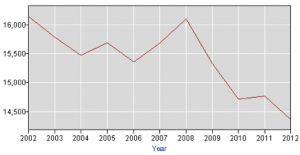By Rick Manning — Fewer and fewer Americans are represented by labor unions with only 6.6 percent of private sector workers belonging to organized labor in 2012 according to a survey released by the federal government last week.
The stunning drop in private sector labor union membership over the past ten years parallels organized labor’s decision to engage in massive political expenditures designed to elect supposed pro-labor candidates to office.
Since 2002, union membership dropped by more than 1.75 million with the losses almost exclusively occurring since 2008. Ironically, these losses almost directly coincide with when the impacts from one of organized labor’s greatest political successes of the decade kicked in — the election of the Pelosi-Reid Congress.
The plummeting number of private sector union members, and there are now more public employees who are union members than private sector employees, means that the labor union leaders will be forced into the choice between supporting policies that increase their public sector base, which harm opportunities to create private sector jobs for their members.
The fact that Richard Trumka, the former head of the United Mine Workers union, who now heads the AFL-CIO, was an emphatic supporter of President Obama’s re-election while the mine workers (AFL-CIO affiliated) remained neutral in the race points out this internal tension. Obama’s aggressive anti-mining stance through both the EPA and the Department of Interior has made the President a pariah in coal country. Yet, when push came to shove, those who go into the mines were disregarded by their union brethren whose bigger fish to fry are solely related to expanding the size and scope of government.
While the decline of the private sector union employee has political implications, it also most importantly may force a change in the focus of those very labor leaders who purport to lead them.
The dirty little secret within the labor union world is that many of these very unions which are spending millions upon millions of dollars to elect candidates who are killing their members’ jobs have a different problem — dramatically underfunded pension systems.
In 2012, the Labor Department listed 212 private sector labor unions as being critically underfunded. The notice specifically states the danger, “The Fund is in critical status (red zone) as of January 1, 2012… This means that contributions will not be enough to meet government standards for funding promised benefits plus those that participants are currently earning.”
Among the big name unions that have either national or local pensions clinging on the edge of not being able to meet their basic responsibilities to their own members are: the International Brotherhood of Teamsters, the Service Employees International Union (SEIU), the International Brotherhood of Electrical Workers (IBEW), and the United Food and Commercial Union. Note that many of these unions are AFL-CIO affiliated.
Literally hundreds of thousands of workers’ pensions are being short changed by the labor unions themselves while those same unions spend millions on promoting the very political agenda that is killing their members’ jobs.
In 2010, desperate union officials like Jimmy Hoffa, Jr. pushed hard to get union pensions bailed out by putting the taxpayers on the hook for a portion of the benefit costs. With the election of a Republican-led House of Representatives, that effort was sidelined and the issue of union pensions’ impending default on their members’ retirement payments was pushed aside.
Today, Congress and states should act on protecting these workers and pensioners by requiring that labor unions bring all of their local affiliates’ pensions systems up to 100 percent funding levels, before they can spend one dime on politics.
The more than 93 percent of non-union taxpayers should not, and cannot afford to, bail out the labor unions who have failed to meet their basic fiduciary responsibilities to their members.
To continue to allow these labor leaders to continue to spend money that rightfully should be paying for their members’ pensions on greasing political palms would be unconscionable.
When union retirees find themselves getting twenty cents on the dollar they were promised for retirement, they will only have their own labor leaders to blame. A group that has chosen to pursue craven politics at the expense of their own members’ basic needs.
And perhaps that attitude by labor leaders explains more than anything else, the choice that workers are making all over America to reject union membership and the declining private sector union rolls that result.
Rick Manning (@rmanning957) is the Vice President of Public Policy and Communications at Americans for Limited Government and a former public affairs chief of staff at the U.S. Department of Labor.







